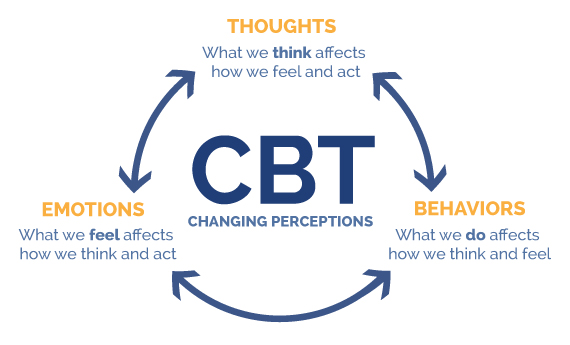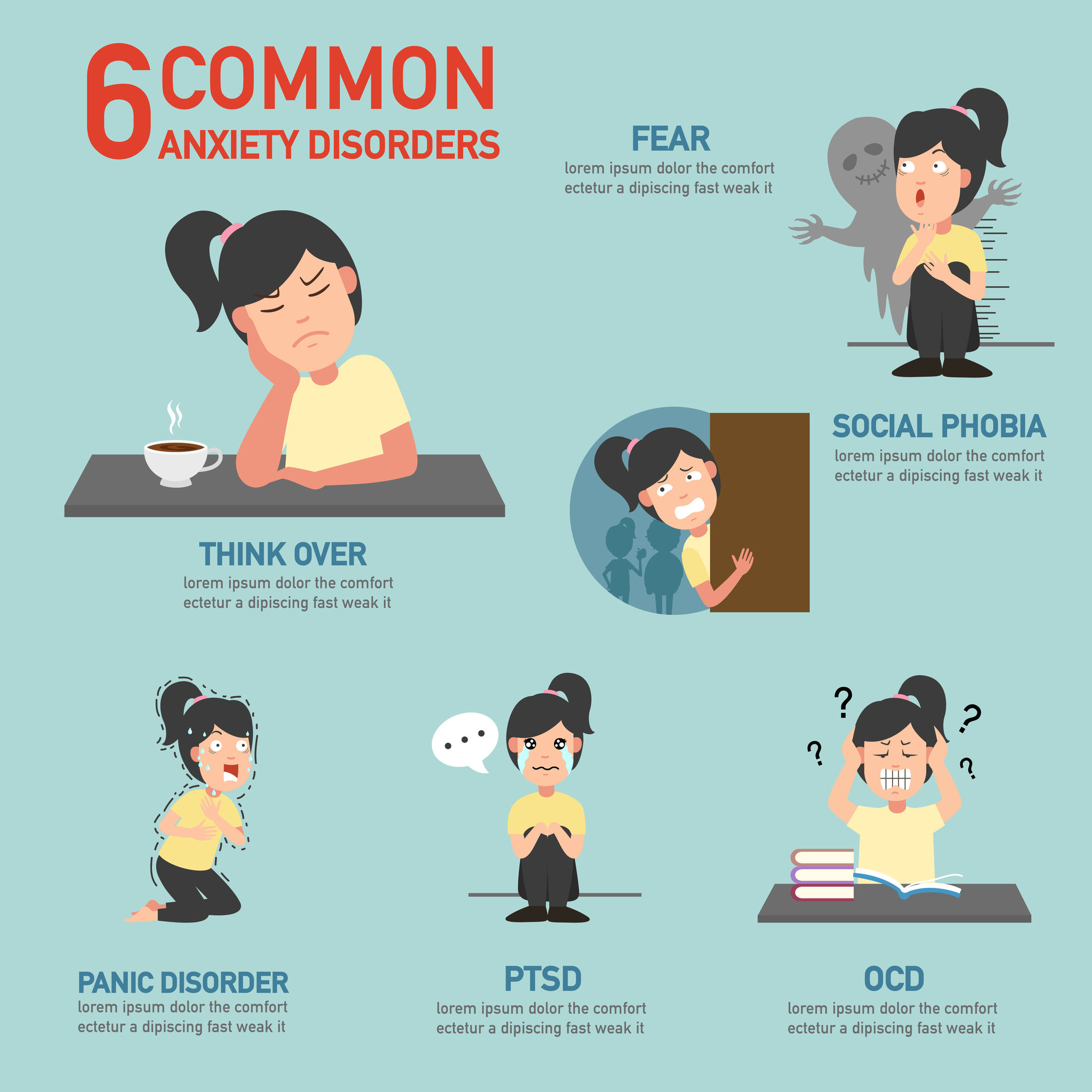Discovering Various Methods in Coaching for Anxiety Condition for Lasting Change
When dealing with anxiousness conditions, it's necessary to check out a selection of counseling methods. Each technique supplies one-of-a-kind understandings and tools to help you manage your symptoms efficiently. You may discover that incorporating techniques can generate the finest outcomes. Nonetheless, understanding the subtleties of these approaches is vital to cultivating lasting adjustment. What if the right mix could launch a new level of psychological wellness for you?
Understanding Anxiety Disorders: A Quick Review
Stress and anxiety disorders, which affect millions of individuals worldwide, can substantially influence daily life. You could experience frustrating feelings of anxiety or fret that seem unmanageable. These feelings can bring about physical signs like a racing heart, sweating, or perhaps dizziness. Common sorts of stress and anxiety conditions include generalised stress and anxiety disorder, panic attack, and social anxiousness problem. Each has one-of-a-kind indicators, yet they all share a propensity to disrupt your regular and relationships.Understanding the origin creates of your anxiety is vital. It could originate from genes, brain chemistry, or life experiences. Recognizing your triggers can aid you handle your actions much better. It is very important to bear in mind that you're not the only one in this struggle. Several people deal with comparable challenges, and seeking assistance is a solid step toward feeling much better. By learning more about anxiousness disorders, you're already on the path to understanding and handling your problem more properly.
Cognitive-Behavioral Treatment: Challenging Unfavorable Idea Patterns
In Cognitive-Behavioral Treatment, you'll begin by determining the unfavorable idea triggers that add to your anxiousness. You'll work on replacing them with more favorable alternatives when you identify these ideas. With each other, you'll construct reliable coping strategies to assist manage your stress and anxiety in daily situations.
Identifying Unfavorable Thought Triggers

Recognizing the details triggers behind your adverse thoughts can be necessary in handling anxiety when you come across moments of distress. Start by taking note of scenarios that prompt feelings of concern or anxiety. Is it a crowded area, a forthcoming due date, or a discussion with particular individuals? Write down these circumstances in a journal. This will assist you determine patterns in your reasoning. Notice physical experiences that accompany your adverse ideas, like an auto racing heart or rigidity in your breast. By determining these triggers, you gain insight right into what's fueling your anxiety. Understanding these connections is the primary step in testing those ideas and ultimately regaining control over your emotional feedbacks.
Changing Thoughts With Positives
Challenging negative thought patterns is a crucial action in transforming your state of mind and minimizing anxiety. You may typically find yourself entraped in cycles of self-doubt or catastrophic thinking. As opposed to allowing these thoughts determine your sensations, method changing them with favorable affirmations or realistic alternatives. For example, when you believe, "I can not handle this," shift it to, "I can handle obstacles one action at once." This straightforward adjustment can considerably affect your emotion. Routinely determining and responding to these adverse ideas aids develop a much healthier inner discussion. Bear in mind, it requires time and initiative, yet consistently practicing this technique can result in long lasting modification, encouraging you to encounter stress and anxiety with restored confidence and resilience.
Building Coping Strategies With Each Other
Changing adverse ideas is only the beginning of managing anxiousness properly. To develop long-term adjustment, you need to develop coping methods that equip you. Cognitive-Behavioral Therapy (CBT) helps you determine and challenge those purposeless idea patterns. With each other, you and your counselor can discover just how these thoughts impact your feelings and behaviors.Start by creating practical techniques, like journaling or mindfulness exercises, that permit you to challenge stress and anxiety head-on. When you encounter your worries slowly, you'll learn to react differently.

Mindfulness and Acceptance-Based Approaches: Cultivating Present-Moment Awareness
As you browse the intricacies of stress and anxiety, including mindfulness and acceptance-based methods can substantially enhance your capability to grow present-moment understanding. By concentrating on the present moment, you'll locate that you can observe your thoughts and feelings without judgment (Counseling services for anxiety). This practice aids you acknowledge your stress and anxiety without really feeling overwhelmed by it.Engaging in mindfulness exercises, such as deep breathing, body scans, or assisted reflections, allows you to ground yourself in your present experience. Acceptance-based approaches encourage you to accept your feelings instead than fight against them. When you accept your sensations, they shed their power over you.Incorporating these techniques into your everyday regimen can change just how you respond to stress and anxiety. You'll develop strength and learn to browse difficult scenarios with greater ease. Eventually, cultivating present-moment recognition lays the foundation for long lasting change, empowering you to lead an extra meeting life
Direct Exposure Therapy: Confronting Fears Gradually
Direct exposure therapy helps you challenge your fears in a progressive method, making it less frustrating. You'll discover techniques to encounter anxiety-provoking scenarios step by action, while likewise developing coping techniques to handle your responses. This method encourages you to take control and lower anxiousness with time.
Gradual Exposure Techniques

When facing anxiousness, slowly confronting your concerns can be a powerful means to restore control. This strategy, referred to as gradual direct exposure, involves gradually exposing on your own to the situations or things that trigger your anxiousness. Start with much less intimidating circumstances and slowly work your way up to more difficult ones. As an example, if you're scared of public speaking, you might start by speaking in front of a mirror, then advance to sharing thoughts with a buddy, and at some point resolve a tiny group. Each step assists desensitize you to the worry, building your self-confidence gradually. Keep in mind, it's vital to speed yourself and commemorate little victories as you relocate through this process, reinforcing your capability to handle anxiety successfully.
Building Coping Methods
Structure reliable coping approaches is vital for handling anxiousness, especially as you face your concerns progressively - Counseling services for anxiety. One effective method is direct exposure therapy, where you start by encountering your concerns in a controlled fashion. Start with much less frightening scenarios and gradually function your method as much as more difficult circumstances. This gradual direct exposure aids desensitize you to anxiousness activates, making them much less overwhelming.Incorporate relaxation strategies, such as deep breathing or mindfulness, to soothe your mind during direct exposure. Track your development, commemorating small success in the process to enhance your confidence. Keep in mind, it's all right to take your time; the goal isn't perfection however steady improvement. By developing these approaches, you'll empower yourself to navigate anxiety and embrace life more totally
Psychodynamic Treatment: Uncovering Root Reasons of Anxiousness
Psychodynamic treatment explores the subconscious mind, exposing the source of your anxiousness. By analyzing your thoughts, sensations, and previous experiences, this strategy assists you uncover underlying problems and unresolved concerns that might add to your existing anxiousness. You'll collaborate with a specialist to explore childhood experiences, relationships, and emotional patterns that shape your feedbacks today.As you obtain understanding right into these much deeper layers of your psyche, you'll begin to recognize exactly how previous events affect your present actions. This understanding can result in catharsis, permitting you to process feelings you may have suppressed.Through the healing connection, you can also recognize defense systems that may have developed gradually, supplying a clearer course to transform. Ultimately, get more info psychodynamic therapy equips you with the tools to resolve your anxiety at its core, promoting long-term improvement in your psychological well-being.
Integrative and Alternative Approaches: Integrating Strategies for Greater Efficacy
Integrating numerous healing techniques can improve your journey towards taking care of stress and anxiety much more properly. By combining aspects from cognitive-behavioral therapy, mindfulness methods, and alternative approaches, you can produce an individualized strategy that resolves your unique needs. You may utilize cognitive-behavioral strategies to test adverse idea patterns while integrating mindfulness workouts to ground on your own in the existing moment.Additionally, checking out alternative practices such as yoga or reflection can advertise leisure and lower anxiousness signs and symptoms. This mix enables you to create higher self-awareness and resilience.Experimenting with these varied methods can assist you discover what reverberates most with you. Remember, it has to do with locating a synergy that functions, rather than adhering to a solitary technique. This integrative technique not only supplies immediate relief yet also promotes lasting skills for handling anxiousness, equipping you to redeem control over your life.
The Role of Assistance Systems: Structure Durability Through Connection
While it might seem that managing anxiousness is a singular journey, having a strong support group can play an important role in your resilience. Bordering yourself with understanding close friends, family members, or support groups develops a risk-free room where you can freely share your experiences and sensations. You remind on your own that you're not alone in this struggle.These partnerships use support and can give practical coping techniques that have functioned for others when you connect with others. It's additionally an opportunity to get point of view; pals can assist you see situations in a different way, reducing sensations of isolation.Moreover, emotional support fosters a feeling of belonging, which can significantly relieve anxiousness signs. By leaning on your support group, you can build durability and take on difficulties better. Bear in mind, reaching out for help is a sign of stamina, and it can make all the difference in your trip towards taking care of anxiety.
Frequently Asked Concerns
What Are the Typical Signs of Anxiousness Problems?
You might experience restlessness, tiredness, problem concentrating, irritation, muscle mass stress, and rest disruptions. Physical symptoms can include fast heartbeat, sweating, and trembling. Acknowledging these indicators early can aid you seek suitable assistance and therapy.
The Length Of Time Does Therapy Normally Last for Anxiousness Disorders?
Therapy for anxiety conditions commonly lasts anywhere from a couple of weeks to several months. It really depends on your private requirements, progression, and the strategies your therapist makes use of to aid you handle your anxiety efficiently.
Can Medicine Be Made Use Of Together With Treatment for Anxiousness?
Yes, drug can most definitely be made use of along with therapy for anxiety. Incorporating both techniques commonly improves treatment performance, assisting you handle symptoms while exploring underlying concerns with therapy (Counseling services for anxiety). Constantly consult your doctor for individualized recommendations
Are There Self-Help Approaches for Handling Anxiety?
Yes, there are numerous self-help techniques for taking care of stress and anxiety. You can exercise mindfulness, participate in regular exercise, keep a balanced diet regimen, establish a regular, and make use of deep breathing strategies to assist reduce stress and anxiety symptoms successfully.